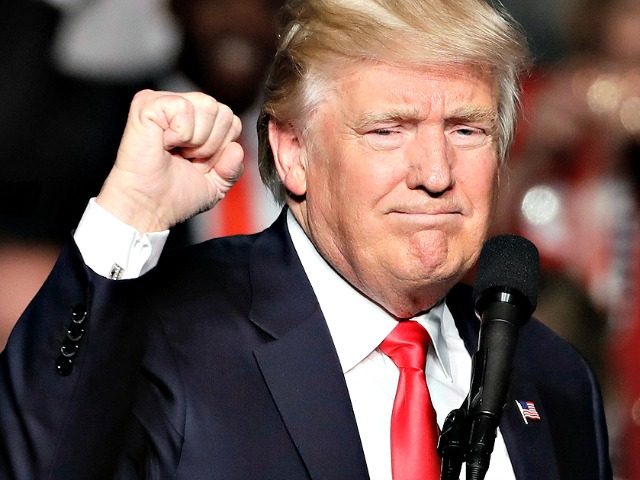U.S. Constitution
See other U.S. Constitution Articles
Title: Trump Can Win Travel Ban Case at Supreme Court Simply by Enforcing It
Source:
Breitbart
URL Source: http://www.breitbart.com/big-govern ... upreme-court-simply-enforcing/
Published: Jun 26, 2017
Author: Joel B Pollack
Post Date: 2017-06-26 14:44:29 by cranky
Keywords: None
Views: 2902
Comments: 6
Monday’s decision by the U.S. Supreme Court to lift the injunction against most of President Donald Trump’s “travel ban” is a major victory — and not just because he will be able to implement the policy, but because the case is only scheduled to be heard in the fall, i.e. in October at the earliest. Because most of the controversial provisions of the executive order only last 90 days, Trump it could be fully implemented before the Court hears the case. The Court is prevented from hearing disputes that are already moot. There must be an active case or controversy in order for challenges to the executive order to be heard. The second version of Trump’s executive order suspends travel from six terror-prone countries for 90 days, and suspends the refugee program for 120 days. Both of those deadlines could be reached before the Supreme Court hears oral arguments, and certainly before it issues a decision. Some of Trump’s supporters might want to have the case heard, in order to clarify the legal principles on which his executive orders were based — namely, that the President of the United States has broad discretion over immigration and that the judiciary must show deference to the executive in matters of national security. They would also like to see the dubious legal reasoning of some lower court decisions — especially the idea that campaign rhetoric can be used to discern the intent behind presidential actions — tossed aside. But the risk of being shot down by the Court may simply not be worth the trouble, given the Court’s recent penchant for inventing bizarre new legal theories. Trump can “win” simply by following through on the executive order, then declaring it fulfilled before the Court hears the various challenges to the case, cutting the Gordian Knot of legal theories and advancing his policies. 
Post Comment Private Reply Ignore Thread
Top • Page Up • Full Thread • Page Down • Bottom/Latest
#1. To: cranky (#0)
(Edited)
This is true. But who better to challenge the courts than Trump -- some future McCain-type? A Jeb Bush-type? The U.S. Supreme Court would think twice about playing games with Trump. There's already talk of a 9th Circuit shake- up.
Please, lord, let it be so.
Trump should extend the ban, as necessary, and keep some element alive, so that the traditional executive powers are very clearly upheld by the Supreme Court. That will put dry ice on any court that would seek to act politically to block him again. The Supreme Court is Republican, and Trump should not be afraid to wield it when he's right, which he is in this case.
Still, as he author pointed out 'given the Court’s recent penchant for inventing bizarre new legal theories', why risk it?
To establish the precedent. To clear the path for aggressive executive action by Trump. Flip the coin over to the other side: a series of big wins by Trump, using the Republican Supreme Court in this way, will establish a string of staggering Democrat defeats. Precedent will be established in a whole series of areas that will carve back the Democrat agenda, and make the Democrats afraid to "risk it" by going to court and losing more. Seize BACK the judicial system from the Left and use it to unravel what they have done. The court ruled today also that churches cannot be cut out of government funding for general projects such as playgrounds (in the example).
Or some would say "roll the dice". I still don't trust this scotus to get things right. Bizarre new legal theories are right up their alley.
Some of Trump’s supporters might want to have the case heard, in order to clarify the legal principles on which his executive orders were based — — — — — — — — namely, that the President of the United States has broad discretion over immigration and that the judiciary must show deference to the executive in matters of national security. They would also like to see the dubious legal reasoning of some lower court decisions — especially the idea that campaign rhetoric can be used to discern the intent behind presidential actions — tossed aside. But the risk of being shot down by the Court may simply not be worth the trouble, given the Court’s recent penchant for inventing bizarre new legal th theories.
#2. To: misterwhite (#1)
There's already talk of a 9th Circuit shake- up.
#3. To: cranky (#0)
#4. To: Vicomte13 (#3)
The Supreme Court is Republican, and Trump should not be afraid to wield it when he's right, which he is in this case.
#5. To: cranky (#4)
Still, as he author pointed out 'given the Court’s recent penchant for inventing bizarre new legal theories', why risk it?
#6. To: Vicomte13 (#5)
To establish the precedent. To clear the path for aggressive executive action by Trump. Flip the coin over to the other side
Top • Page Up • Full Thread • Page Down • Bottom/Latest
[Home] [Headlines] [Latest Articles] [Latest Comments] [Post] [Mail] [Sign-in] [Setup] [Help] [Register]
